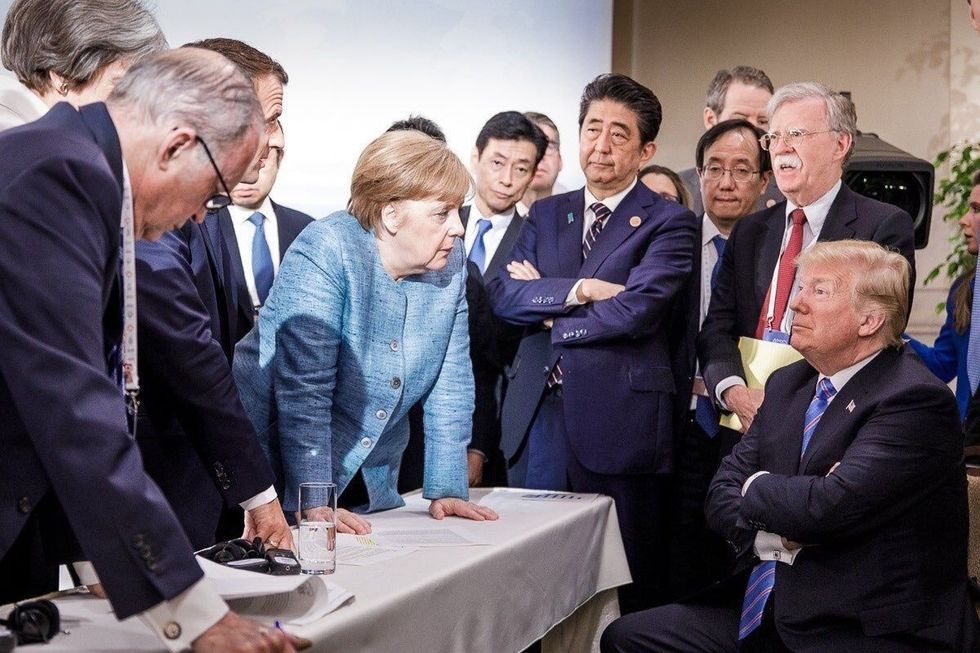Back in 2016, presidential candidate Donald Trump presented his vision for an "America First" foreign policy, which symbolized a radical departure from the US' longtime approach to international politics and diplomacy.
In electing Donald Trump, a political outsider, to the top job, American voters essentially gave him a mandate to follow through on these promises. So, has he?
Trade
"A continuing rape of our country."
On the 2016 campaign trail, candidate Trump said that the Trans Pacific Partnership (TPP) — a 12 country trade deal pushed by the Obama administration — would "rape" America's economy by imperiling the manufacturing sector, closing factories, and taking more jobs overseas.
While President Trump swiftly delivered on his promise to quit the TPP, it's clear that Trump's signature move has not had its desired effect.
Trump's protectionist policies — including an ongoing trade war with China — have in fact caused manufacturing factories to shutter in many US cities, resulting in the loss of thousands of manufacturing jobs. In the crucial swing state of Michigan, for example, there were 10,200 fewer manufacturing workers in February 2020 than the previous year. Nearly 1,800 factories — many in important swing states like Pennsylvania, Ohio and Wisconsin — were forced to shut their doors between 2016 to 2018 as automation ramped up.
To be sure, the pandemic-induced recession has pummeled America's economy across the board, but a recent report by the Bureau of Labor Statistics concludes that even before the health crisis, US manufacturing was on track to lose nearly 450,000 jobs by 2029, the most of any sector.
Meanwhile, the US trade deficit, an indicator Donald Trump repeatedly cited in the lead-up to the 2016 election to justify provoking China, has ballooned under his watch: in August of this year, the US' overall trade deficit was $67.1 billion, the highest on record since 2006. In addition, US exports to China continue to fall behind the benchmark set under the "phase one" trade deal signed by Beijing and Washington earlier this year.
Foreign conflicts and troop withdrawals
"I will never send our finest into battle unless necessary...The world must know that we do not go abroad in search of enemies."
When candidate Trump announced his bid for the White House, withdrawing troops from conflicts in far-flung places around the world — particularly in Iraq, Syria, and Afghanistan — quickly emerged as a key campaign promise. And polling shows that this pledge resonated deeply with a war-weary American public.
Has Trump delivered? Somewhat. In 2017, he sent an additional 3,000 troops to war-torn Afghanistan. Today, there are still 8,600 American soldiers there, though President Trump recently tweeted that he hopes to withdraw all US troops from Afghanistan by Christmas, a pre-election forecast that reportedly delighted the Taliban and caught the Pentagon completely off-guard.
In Syria and Iraq, meanwhile, President Trump followed through on his campaign promise to "beat ISIS" by continuing the Obama administration's military campaign against the militant group. This was followed by the hasty withdrawal of around 700 US troops from northern Syria in 2019, which many observers said would endanger America's Kurdish allies, causing the US Defense Secretary to resign in protest.
Treaties
"[I will] dismantle the disastrous deal with Iran."
From the outset, candidate Trump made clear that the Obama-era Iran nuclear deal would have a short shelf life under his administration, calling it "the worst deal ever negotiated." And in 2018, President Trump followed through by walking away from the accord that was negotiated with American allies including France and Germany, and slapping fresh sanctions on Iran. On the face of it, it was a promise kept.
Similarly, having long referred to climate change as a "hoax," candidate Trump vowed to walk away from the Paris Climate Accords, signed by 200 countries, which he said would stifle American economic growth. Again, President Trump made good on a longtime pledge — but the official exit only occurs on November 4, a day after the US election, and Joe Biden has vowed to rejoin should he win.
Love him or hate him, when it comes to foreign policy Donald Trump is a... politician. While he has failed to deliver on some campaign promises, in many instances, President Trump has done exactly what American voters sent him to Washington to do.






